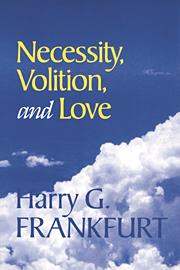Book contents
- Frontmatter
- Contents
- Preface
- Sources
- 1 The Logic of Omnipotence
- 2 Descartes's Discussion of His Existence in the Second Meditation
- 3 Descartes on the Creation of the Eternal Truths
- 4 Two Motivations for Rationalism: Descartes and Spinoza
- 5 Continuous Creation, Ontological Inertia, and the Discontinuity of Time
- 6 Concerning the Freedom and Limits of the Will
- 7 On the Usefulness of Final Ends
- 8 The Faintest Passion
- 9 On the Necessity of Ideals
- 10 On God's Creation
- 11 Autonomy, Necessity, and Love
- 12 An Alleged Asymmetry between Actions and Omissions
- 13 Equality and Respect
- 14 On Caring
6 - Concerning the Freedom and Limits of the Will
Published online by Cambridge University Press: 15 December 2009
- Frontmatter
- Contents
- Preface
- Sources
- 1 The Logic of Omnipotence
- 2 Descartes's Discussion of His Existence in the Second Meditation
- 3 Descartes on the Creation of the Eternal Truths
- 4 Two Motivations for Rationalism: Descartes and Spinoza
- 5 Continuous Creation, Ontological Inertia, and the Discontinuity of Time
- 6 Concerning the Freedom and Limits of the Will
- 7 On the Usefulness of Final Ends
- 8 The Faintest Passion
- 9 On the Necessity of Ideals
- 10 On God's Creation
- 11 Autonomy, Necessity, and Love
- 12 An Alleged Asymmetry between Actions and Omissions
- 13 Equality and Respect
- 14 On Caring
Summary
What are we talking about when we talk about “the freedom of the will”? Neither in common speech nor in the special vocabulary of philosophers does the term “free will” have an unequivocal standard use. Nor is there, in our thinking about ourselves, any clear and specific function that the notion of free will is generally understood to serve. Just what aspect or possibility of experience is it supposed to grasp? What location in the schematism of our reflection does it address?
The notion is problematic, indeed, with respect to both of its elements. Not only is it as difficult in this context as it is in others to pin down the precise meaning of freedom. In addition, our idea of the will is itself rather vague. It is no wonder, then, that discussions of the freedom of the will tend to be murky and inconclusive.
Even people who recognize that they do not quite know what they are talking about, however, may be fully and (more or less) justifiably confident concerning what to say. That is the position in which Rogers Albritton confesses that he finds himself: “Free will is what we've got if the will is free, as of course it is. I don't know exactly what any of that means, but I don't know how to doubt that we've got free will, either. The will is free, whatever that means.”
- Type
- Chapter
- Information
- Necessity, Volition, and Love , pp. 71 - 81Publisher: Cambridge University PressPrint publication year: 1998

